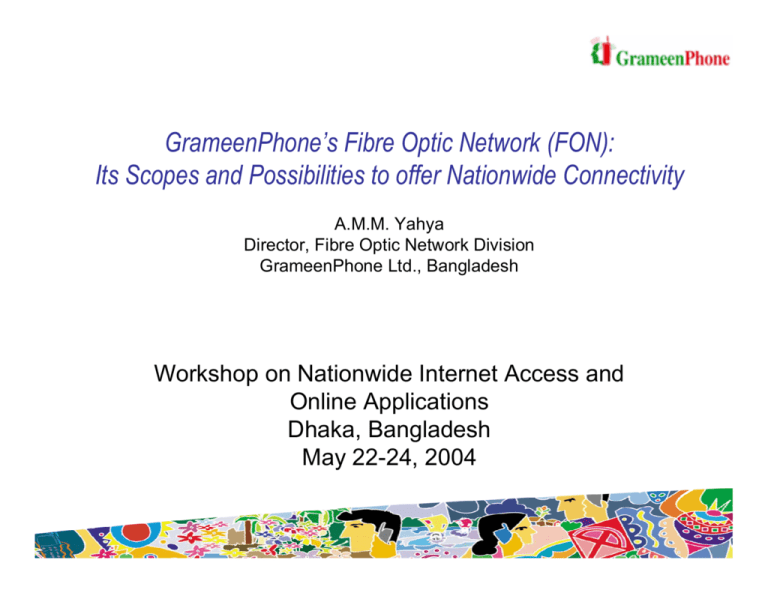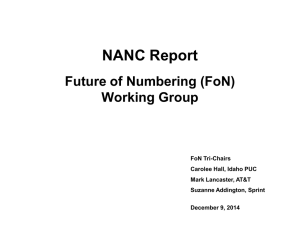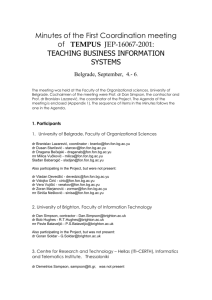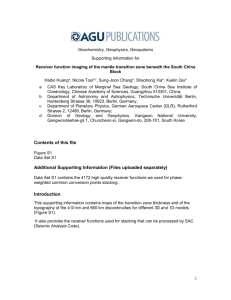GrameenPhone's Fibre Optic Network (FON)
advertisement

GrameenPhone’s Fibre Optic Network (FON): Its Scopes and Possibilities to offer Nationwide Connectivity A.M.M. Yahya Director, Fibre Optic Network Division GrameenPhone Ltd., Bangladesh Workshop on Nationwide Internet Access and Online Applications Dhaka, Bangladesh May 22-24, 2004 Contents: • GrameenPhone Ltd. • Fibre Optic Network (FON) Division • Fibre Optic Network (FON) • Last Mile Solution • GrameenPhone’s (GP) Nation Wide Telecom Backbone Infrastructure • Available Telecom Backbone Infrastructure for Nation Wide Connectivity GrameenPhone Ltd. November 28, 1996: • GrameenPhone (GP) was offered a cellular license in Bangladesh by the Ministry of Posts and Telecommunications March 26, 1997: • GrameenPhone,1st GSM Company, launched its service on the Independence Day of Bangladesh After seven years of Operation: • GrameenPhone has more than 1.6 Million subscribers as of May, 2004 with more than 60% market share. GrameenPhone Ltd. (contd.) The Purpose: • GrameenPhone (GP) has a dual purpose: to receive an economic return on its investments and to contribute to the economic development of Bangladesh where telecommunications can play a vital role. The Strategy: • GrameenPhone’s basic strategy is to extend coverage to both urban and rural areas. GrameenPhone Ltd. (contd.) Contribution to National Development: • Contribution to National Treasury : Taka 13,601,722,062 (up to 2003) • Contribution to Bangladesh Railway (BR) only: Taka 619,053,061 • Small Enterprise business originated • Rural Economic Development- Village Phones (53,620 subscribers) • Proliferation of ICT through the use of Fiber through sub-lease • Job directly created for more than 1000 in GP, 140 in BR, more than 50,000 indirectly with Dealers, Agents etc. Fibre Optic Network (FON) Division July, 2003: • Fibre Optic Network (FON) Division was created as full-fledged Division from July, 2003 to manage the Fibre Optic Network (FON) and create & sell the Transmission Capacity commercially to the prospective business units/clients. • The Management philosophy is based on shared responsibility and mutual Understanding among the people working at FON Division. Creativity and Innovations are encouraged. The Management envisages to build it as an independent business entity, eventually. • The work of this Division comprises of 3 main units such as 1) Technical 2) Co-ordination and 3) Sales & Marketing. Fibre Optic Network (FON) Division (contd.) Policy of Capacity Sale: • FON Division (GP) shall sell capacity at E1 PCM level only & Would not provide last mile connectivity. The Division (GP) shall refer all clients of channel level requirement either to Its Strategic Partner (X-Net) or the Dealer /Agent (Ranks ITT). • GP (FON) would determine the selling price (highest) and the rate of discount to be given on the basis of volume and duration of contract of the E1 PCM. • X-Net and Ranks-ITT would sell capacity at channel level only providing Last Mile Connectivity (LMC). Choice of LMC provision and the price for the last mile connectivity shall be determined by X-Net and Ranks ITT. Fibre Optic Network (FON) Division (contd.) Policy of Capacity Sale (contd.) : • Price of selling at E1 PCM shall be cheaper than selling at channel level. • FON (GP) shall arrange a common point of termination beside the GP Installations for E1 PCM customers, including X-Net and Ranks ITT. • FON (GP) would provide DC supply to FON customers subject to availability at a cost determined by GP for such power. Fibre Optic Network (FON) Division (contd.) Some of the clients to whom Nationwide Internet Access and Data Connectivity provided: 1. Grameen Communications Ltd. 2. Siemens Bangladesh Ltd. 3. Aventis Ltd. 4. Plan International Bangladesh 5. Techno Online Ltd. 6. Srimongol Online Services 7. Southnet Online Ltd. 8. Bangladesh Express Co. Ltd. 9. BRAC Bdmail Network Ltd. 10.Polly Dot Net 11.Dragon Group Fibre Optic Network (FON) Division (contd.) Some of the clients to whom Nationwide Internet Access and Data Connectivity provided (contd.). 12. Global Access Ltd. 13. Lever Brothers Bangladesh Ltd. 14. DHL Worldwide Express 15. Heidelberg Cement 16. Shell Bangladesh 17. Berger Paints 18. Expeditors Ltd. 19. Mutual Trust Bank 20. IDLC 21. SBI 22. Ispahani 23. Global On-line Fibre Optic Network (FON) Division (contd.) Growth of Nationwide Internet Access and data connectivity traffic through the Years 2002-2004: Bandwidth (kbit/s) 3500 3000 2500 2000 1500 1000 500 0 Bandwidth (kbit/s) Year-2002 Year-2003 Year-2004 (for five months) Fibre Optic Network (FON) Division (contd.) Business Opportunity employing Nationwide GP FON Connectivity: Areas : • Education • Research • Healthcare & • Economic Development • ICT To Offer : • • • • • • • Fixed Telephony (Other Operators) Internet Services (Local ISPs, Large ISPs, Cyber Café) Domestic Data Connectivity (Domestic Data Service Providers) Distance Learning (NGOs, Universities) Video Conferencing (Govt. Agencies/ Offices, Ministries etc.) Connectivity for Utility Services (Electricity, Gas, Water Supply etc.) Connectivity for financial institutions such as Banks, Corporate Houses, Fibre Optic Network (FON) Division (contd.) Business Opportunity employing Nationwide GP FON Connectivity (contd.) : • • • • • • • • Small and Medium Enterprises, Industries Bandwidth on Demand (SME, Corporate Houses, SOHO). Dial up mobile internet (Nationwide ISP) Cable TV (Entertainment/ Education etc.) Telemedicine (NGO, Medical & Healthcare Entrepreneur). Terrestrial Video Broadcasting (Private TV Broadcasters). Internet Exchange (ISP and VoIP licensees). Call Center (GSM, PSTN subscribers, Telco). Fibre Optic Network (FON) – used for Nationwide Internet Access and On-line applications • The word “Internet” derives from Inter-Net working, meaning the interconnecting of networks. This defines the Internet in abroad sense. • The Internet is based on a TCP/IP network called NSFnet, which was financed constructed by the U.S. National Science Foundation (NSF) to promote research and education. • First online Internet service was introduced in Bangladesh in 1996 • Access Network: consists of two parts from the network function. One is “Transit network” and the other is “Access network” GrameenPhone Fibre Optic Network (FON) has been used as “Transit Network” for Nationwide connectivity. Fibre Optic Network (FON) • For the purpose of building a Nation wide Telecom Backbone Infrastructure for Its own use, GrameenPhone (GP) acquired the Optical Fiber Network of Bangladesh Railway (BR), back in 1997 through a lease contract for 20 (twenty) years from the date of signing. • GrameenPhone Nation Wide Telecom Backbone Infrastructure has been built on SDH Fibre Optic Network (FON) and Microwave Radio Links. SDH Fibre Optic Network refers to a group of fibre optic transmission rates that can transport digital signals with different capacities. • Total length of GrameenPhone Optical fibre is now about 2000km (2004) and the maximum capacity is STM-4 (622Mbps, 252 E1 PCM), ready for upgrading to STM-16 (2488 Mbps, 1008 E1 PCM). Fibre Optic Network (FON) (contd.) Why GP’s Fiber? • Nationwide coverage • Technical expertise • Robust network • Minimum downtime for non-protective circuits • Redundant Network option • Cost-effective • Right of way in the Bangladesh Railway Network • Public but yet private enough to give best negotiated prices • Best possible option available Fibre Optic Network (FON) -continues Advantages of Fibre over other Transmission media: Wires Coax Fiber Microwave Radio Satellite Availability Good Good Good Good Possible Contention Fair to Good Expandability Fair Good in local area Good Good Good Good Errors Fair Good Good Fair Fair Fair Security Fair Fair Good Poor Poor Poor Distance Good Poor Good Good Good Good Constraints Due to Environment Fair Good Good Fair Fair Fair Last Mile Solution Available Last Mile Solution: • Presently five popular broadband access technologies are available for last mile solution to Telco's: namely, (1) DSL (Digital Subscriber line), (2) Broad-band Wireless Access (BWA), (3) Cable Modem, (4) Optical fiber and (5) Satellite. • We propose to deploy Broadband Wireless Access (BWA) technology which is most appropriate for providing last mile solution to small and medium enterprises in the local loop. It has two distinct advantages over its substitutes/alternatives: such as - it can be deployed in weeks and requires lower initial capital expenditures. Last Mile Solution-continues Some Constraints: • Poor Quality of service (QOS) • Low MTBF and long MTTR of the equipment • Lack of adequate and knowledgeable technical skill • Less/small Investment and looking for short term return in the last mile solution • Lack of long term planning • • Non-availability of proper planning tool Using Multi-vendor equipment and facing problem of integration GrameenPhone Nation Wide Telecom Backbone Infrastructure (Components) GrameenPhone Nation Wide Telecom Backbone Infrastructure carries the traffic (voice & data) from point to point. It consists of three main parts as given below: • Local Network - has been built on PDH MW Radio links in 15GHz & 23GHz frequency band. • Regional Network – has been built on PDH MW Radio links in 7.5GHz frequency band. • Backbone Network - has been built on SDH Fiber Optic Network (FON) and SDH MW Radio links. Some Illustrations: FON Access node at FENI local Network NORTH BRINCHI FNBRC1(42L) DAKTARPARA FENI RAIWAY STATION FNDKP1(42L) RWFEN(42L) NORTH RAMPUR FNRMP1 FNBSP1 BASHPARA FNWUP2 WEST UKILPARA FNCRA1(42L) WEST CHAURIA N Some Illustration (contd.): FON Access node in COMILLA local network N CMJCR1 JUDGE COURT ROAD JHAWTALA POLICE LINE CMJPL1 SUJANOGOR CMSJN1 KANDIRPAR CMKDP1 RWCOM(42L) RAILWAY COMILLA BAZRAPUR CMBZP1 CMNAV1 NAZRUL AVENUE CMDLP1 CMHST3 DAULATPUR 1 HOUSING ESTATE 3 CMLAK2 LAKSHAM 2 Some Illustrations (contd.) FON Access node in KHULNA local Network KHBTTB KHKLP2 KHALISHPUR 2 RAILWAY KHULNA RWKHL(60H) KHHKP1(03) KHSND1 SHONADANGA KHSIQ1 SIR IQBAL ROAD-1 KHFRP1 FARAJIPARA KHKJA2 KHAN JAHAN ALI 2 KHBNK2 BANIAKAMAR 2 N Some Illustration (contd.) FON Access node in NARAYANGANJ local network ALIGANJ 1 NGALG1 LAMAPARA 2 NGLAM2 NGHAG3 HAZIGANJ 3 NGFAT1 FOTULLAH 1 HAZIGANJ 1 NGHAG1 CHASARA 2 NGCHA2 NGMSD1 MASDAI 1 CHASARA 3 NGCHA3 NGMSD2 RAILWAY NARAYANGANJ NGKLB1 RWNRG(52H) NGBDR1 BANDAR 1 NGDBG2 NGDBG1 NGKBL2 NGNIT4 DEOBHOG NGNIT3 NITAIGANJ 3 NGNIT2 NITAIGANJ 2 N Some Illustration (contd.) FON Access node in RAJSHAHI local network N UPOSHAHAR 1 RSUPS1 RJINFO RAILWAY RAJSHAHI RWRJS(42L) RSLXP1 LAXMIPUR 1 RSSKP1 SHEKPARA 1 RJBTTB RSSGP1(03) RSTAL1 TALAIMARI 1 Some Illustration (contd.) FON Access node in SAVAR & JAIDEBPUR local network GPCHD1(03) N SALNA 1 GPSLN1 KALIAKAIR 1 GPKLK1 KALIAKAIR 2 GPKLK2 GPJDP6 RWJDP(70) GPJDP7 JAIDEBPUR 6 DHSVRE(03) GPJDP1(42L) SAVAR 1 DHSAV1 JAIDEBPUR 1 GPJDP3 JAIDEBPUR 3 JAIDEBPUR 6 SAVAR 8 SAV8 GPTON4 SAVAR 7 TONGI 4 DHSAV7 GPPUB1 RAIWAY TONGI GPTON5 KULLA SAVAR 4 TONGI 5 SAV4 GPKAL1 RWTON(42L) MGKLA(42L) SAVA DHSAVC SAVAR A GPTON3 SAVARC TONGI 3 TONGI 1 GPTON1 UTR5 UTRE UTRG UTRB UTR6 SAVAR 5 DHSAV3 KHN1 UTR7 DHUTR1 SAV5 UTR2 SAVAR 3 LKB UTRA MRPEMRP3 MRP4 MRPI MRPN(03) MRPH MRPF SAV6 SAVAR 6 NGMJG1(03) UTR3 JSH2 BHA1 JSH1 GULA DHMRPM(03) GULD BARB MRP6 MRPG MRPB BNN7 MRP1MRP9GB BNNA BARA GULC GUL5 IRB2 IRB1 MRP5 BNNB MRP2 AMB2(03) MRP8 GUL8 BAR1 KAF2 MRP7 BNN4 CP GUL7 MRPC AMB1 BNN9BNN8 KAF3 GUL3GUL4 GULB KLP1 CITYMOH2 BAD1 BRCBLD AGG1AGG3(03) MOH1 GUL1 GUL9GUL6 GUL2 SHM1 NKP2 MOH3 TJG1 ADB2 BAD2 TJG2 MHP6 SHM2 NKP4 MHP3 TJG5 NKP4-N MHP7(03) TJG3 TJG4 MHP2 MHP4KBN2 FRM3 MGB1 RANGS LAL3 LAL1 RMP2 SNBTTB RMP1 MLB6 CT KHL3 KBN5 MGB5 DHNAFRM2 KHL1 MGB6 MLBA DHND MGB4 MLB5 KBN3 KRB3 ARJPR DHNF MGBTTB KRB2 KRB1 KHL2 BAS3 DHNC KBN6 SDW5 RY B3 SDW3 SDW4 MLB9 NSK1 ISTP NSK2 BAS6 SHN2 DHN6 KAK6 DHNB KRB4 KAK7 SHP3 BAS1 SHB4 MHP5 NGRPG1(52H) Some Illustration (contd.) FON Access node in SYLHET local network AMBARKHANA 2 N SYAMB2 AMBARKHANA 1 SYAMB1 SYINFO SAGOR DIGHERPER 1 SYSDP1 SYBTTB SYZIN3 ZINDABAZAR 3 SYKJS1 KAZAL SHAH 1 SYZIN1 ZINDABAZAR 1 SYLMB1 UPASHAHAR 1 LAMABAZAR 1 SYUPS1 SYMJP1 ZINDABAZAR 2 SYZIN2 MOHAJHON POTTI 1 BISWANATH 1 SYSBB1 RWSYL(60H) RAILWAY SYLHET Some Illustration (contd.) FON Access node in CHITTAGONG local network N CGVTR1 DHAKHIN BURIRCHAR CGDBC3 CGSNG1 ACTG CGSHS7 CGCDG4 CGSHS2 CHAH GAON CGSHS3 CGPTL4 CGCDG1 CGNSB1 CGNSB6 CGSHS4 CGKHL1 CGNSB5CGBAK6 CGDMP1 CGPTL2 CGDMP3 CGPTL5 UTTAR HALI SHAHAR CGUHS34 SHSHOHORPAHARTOLI AHSHR CGUHS2 BAKULIA 8 CGLAL1 CGBAK3 CGBAK8 CGBAK2 CGBAKC CGCRB1 CGUHS5 NKBTTB CGASG4 CGBAKB CGBTTB CGASG1 CGBAKX CGLDP1 CGCTR2 CGRJK1 CGORS1 CGAGB3 AKTEL CGBAK7 CGAGBC CGTXP1 CGBAK1 CGAGB1 CGAGB6 CGAGB5 CGAGB4 AGBTTB CGAGB9 CGAGB8 CGGSD1 CGAGB2 BAKULIA 7 CGDHS3 CGPTA1(03) CGDHS1 CGEPZ1(03) CGNAVY UTTAR PATENGA 1 CGUPA1 BAFCTG CGAIR1 Fibre Optic Network (FON) showing FON Access nodes Legend: Optical Fibre cable Lalmonirhat Syedpur SDH Radio links Parbatipur Kaunia Rangpur SDH Access Node Birampur RW Gaibanda Dewanganj Joypurhat N Bonarpara Jamalpur Pearpur Sylhet Santahar Mymonsingh Sarishabari Gouripur G o Natore Ullapara Sirajgong F e n c h u g o n g Kishorgong Atharobari Abdulpur Rajshahi Tangail Bhangora Pakshi Joydebpur Bharob bazar Ishwardi Kustia Poradhaha Tongi Srimangal Saistagong Bajitpur Mirzapur Kulaura Narsingdi Brahmon baria Pangsha Kamlapur Rajbari Chuadanga Gandaria Akhaura Narayangong Comilla Mubarakgang Laksam Jessore Noapara Siramoni Feni Khulna KC Mirersharai RM PP Hathazari Old Railway station Some details of GP’s available Telecom Backbone Infrastructure for Nation Wide Connectivity: • Tower – 42m (heavy) SS Tower (Qty.71), 42m (medium) SS Tower(Qty.47), 52m SS tower (Qty.30) 60m SS tower (Qty.14) 70m SS tower (Qty.07) • Space – Primary 6 divisional Head Quarter. For remaining sites out door solution should be applied for Last mile equipment • DC supply – in all Access Nodes. • Base Station/Access Node – 749 nos. • FON Access Node – 60 nos. • Dist./Thana Coverage – 61/288 nos. Q&A Thank You







